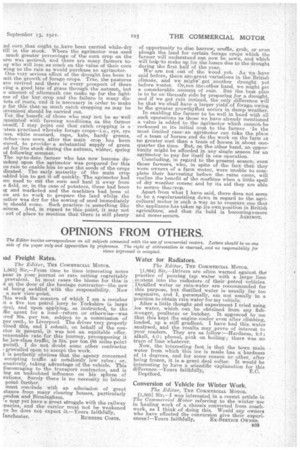OPINIONS FROM OTHERS.
Page 29

If you've noticed an error in this article please click here to report it so we can fix it.
The Editor invites correspondence on all subjects connected with the use of commercial motors. Letters should be on one side of the2-..aper only and typewritten by preference. The right of abbreviation is reserved, and no responsibility for views expressed is accepted.
)ad Freight Rates.
The Editor, TEE COMMERCIAL MOTOR.
1,863) Sir,—From time to time interesting notes pear in your journal on: rate cutting regrettably prevalent. In most cases the blame for this is d at the door of the haulage contractor—the new ad being saddled with the responsibility. Now new view-point.
'his week the -concern of which I am a member it a five ton -petrol lorry to Ycirkshire (a large ttre), and upon applying, as instructed, to the Ific agent for a load—return or otherwise—was naat 20s. per ton, subject to a commission of per cent, to Liverpool. The driver very properly dined this, and I submit, on behalf of the conctor in general, it was not art equitable offer. reasonable rate for this journey, presupposing it be low-class traffic, is Ms.. per ton (65 miles point point). I do not doubt some other contractor travailed upon to accept the work. is Perfectlyobvious that the agency concerned accepting traffic at' needlesalY low rates; or, itnatively, taking advantage of the vehicle. This Iiscouraging to the transport contractor, and is ing an undoubted influence on his sphere of rations. Surely there is no necessity to labour point further.
must conclude with an admission of great_ .stancefrom many clearing houses particularly iondon and Birmingham. re may yet have a great struggle with the railway Epanies,_ and the carrier must not be weakened 're he. does not expect it.—Yours faithfully, fanchester. • RUNNING COSTS.
Water for Radiators.
The Editor, THE COMMERCIAL MOTOR.
L1,8641 Sir,—Drivers are often warned against the practite of pouring tap water with a large, lime content into the radiators of their petrol vehicles. 'Distilled water or rain-water are recommended for this purpose, but distilled water is usually far too
expensive, and personally, am not usually in a position to obtain rain water for my vehicle.
After a little thought and experiment I tried using ice water, which can be obtained from any. fishmonger, poulterer or butcher. It appeared to me that this kept the engine cooler even after climbing, loaded, up a stiff gradient. I have had. this, water analysed, and the results may prove of interest to your readers. They are as follow:—Hardness, 2.8; alkali, 4.0; phenol, pink on boiling; there Was no trace Of lime whatever.
Now, the interesting fact is that the town main water from which this ice is made has a hardness of 14 degrees, and for some reason or other, after being frozen' it is a great deal softer. It would be interesting to have a scientific expla.nation for this difference.—Yours faithfully,
E.C.
Deptford.
Conversion of Vehicle for Winter Work.
The Editor, THE COMMERCIAL MOTOR.
[1,865] Sir,—I was interested in a recent article in The Conlmernial Motor referring to the winter use in hauling work of a chassis converted from coachwork, as I think of doing this. Would any owners who have effected the conversion give their experi
encas1—Yours faithfully, Ex-SERYICE OWNER.
































